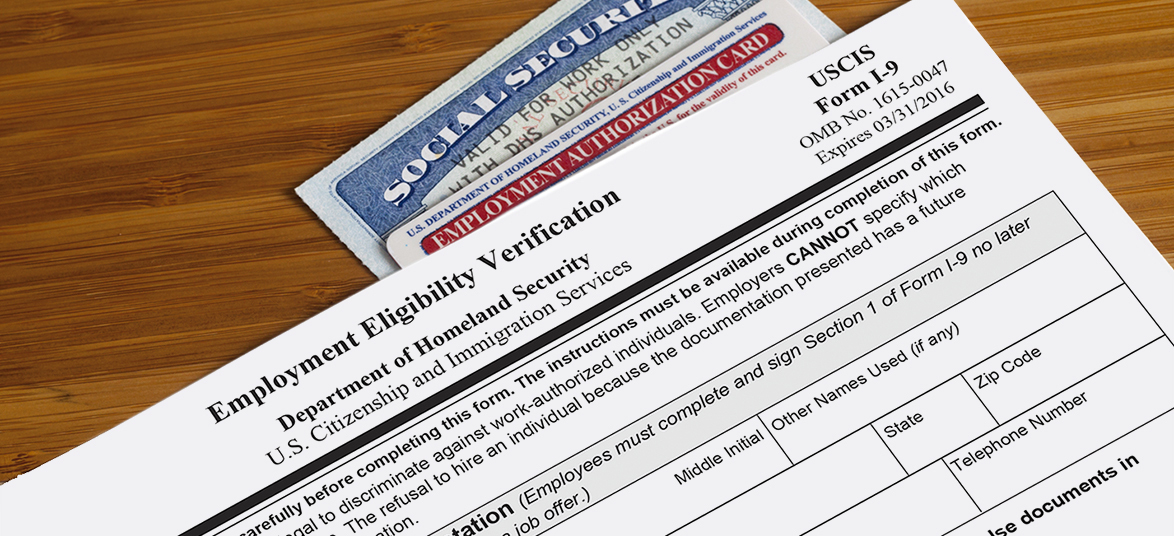This article was last updated on 6/7/2019.
If you’re a small business owner, you already know that the mandatory Form I-9 is tricky to complete. The I-9 is necessary to verify an individual’s right to work in the USA — and requires a careful review of specific types of identification within three days of an employee’s start date.
But does the time element really matter? Who’s going to check? Would the U.S. Immigration and Customs Enforcement (ICE) really target small businesses that never make waves and slap them with costly fines?
There are a lot of misconceptions surrounding I-9 paperwork. Let’s take a closer look at two of the biggest, so you don’t put your business at risk:

Myth No. 1: I-9 Deadlines Are Optional
When it comes to the I-9, the devil is in the details. Employers who don’t pay attention to how and when the form is completed may face penalties for mistakes that could have been avoided.
Time matters. The three-day rule is inflexible. If an employee doesn’t produce the proper identifying documents within the three-day deadline, the employee should be terminated. Immediately.
Backdating the I-9 isn’t a solution either. It’s illegal, and if discovered, carries a hefty penalty for fraud.
It’s critically important that the I-9 be completed on time — with the employee submitting all supporting documents — for one key reason: It legally verifies that an individual has the right to work in the USA.
Without it, questions about a worker’s legal authorization could arise. And if ICE agents choose to investigate, they could conclude that you knowingly hired illegal workers, leaving you open to criminal prosecution.
In fact, falsifying I-9 documents is among the worst actions an employer can take when hiring. In February 2015, an immigration judge fined a California-based manufacturer $12,000 for not timely preparing I-9 forms for 18 employees. Liberty Packaging — a very small business — was penalized for acting in bad faith by backdating the forms after a notice of inspection from the government.

Myth No. 2: I-9 Penalties Are Negligible
In the Liberty Packaging case, ICE sought the maximum baseline penalty for each violation, plus additional fines for acting in bad faith, the seriousness of the violations and the presence of unauthorized workers. The judge fined the company $650 per violation.
Inspections could include workforce site raids to detain and arrest undocumented workers, as well as an I-9 audit, also known as a “silent raid.”
Fines vary, depending on the nature of the offense. A “Uncorrected Technical” issues, such as an employee not entering his or her birth date, address or date of hire or “substantive” failures — which include an employee failing to sign the form or an employer not checking personal identification documents can result in fines ranging from $230 to $2,292 per violation, although such fines are rarely levied.
A violation if an employer knowingly hires or continues to employ an unauthorized alien, the fines range from $573 - $22,927.
Worst still, if you engage in a pattern of hiring unauthorized individuals, you could face criminal penalties of $3,000 per individual and six months in prison.
Something else to keep in mind: ICE assesses penalties per form, so depending on the number of forms and violations per form, the total could be significant.
The message here is clear: Compliance with I-9 standards is mandatory for small and large businesses — and inspections are possible for companies of any size. If you don’t comply, you’ll pay.

Tips for I-9 Compliance
To avoid compliance issues:
- Make sure you understand I-9 penalties for noncompliance
- Verify all remote workers in addition to those who will be on-site
- Periodically conduct internal I-9 audits
Handle New Hire Paperwork More Efficiently
Don’t let your new hire responsibilities turn into a paperwork nightmare. We can help you meet the requirements more easily and efficiently with our online I-9 and W-4 app.
- I-9 deadlines aren’t negotiable; the three-day deadline is firm.
- Backdating I-9 forms is illegal.
- Penalties for I-9 violations range from $230 to $22,927 per violation.
- Be prepared for the possibility of an unexpected ICE I-9 audit.

